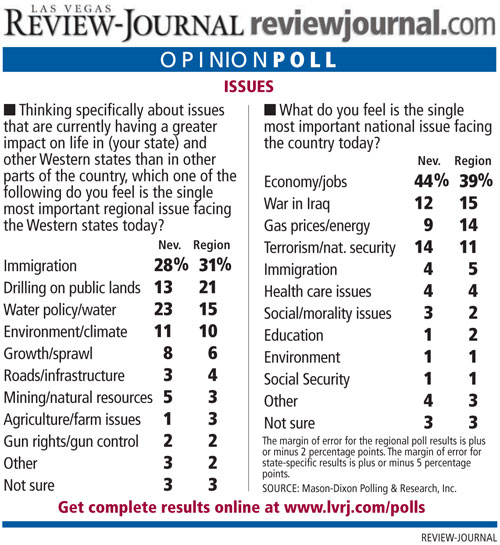Economy, jobs top list of Nevadans’ concerns
The economy is on voters' minds, especially in Nevada, according to a new Review-Journal poll.
Jobs and the economy were considered the No. 1 issue facing the nation by 44 percent of Nevada voters, the highest out of six states surveyed in a joint regional polling effort.
The economy and jobs also was the top issue for Arizona, Colorado, New Mexico, Utah and Wyoming, according to the poll, which was commissioned by the Review-Journal, the Denver Post and the Salt Lake Tribune and conducted by Mason-Dixon Polling & Research Inc.
Nevadans' second-rated issue was terrorism and national security, which 14 percent said was their top concern, followed by the war in Iraq, at 12 percent, and gasoline prices and energy issues, at 9 percent.
Nevadans scored gasoline prices less important than the region as a whole, with 14 percent of voters in the six states calling that their first concern.
The regionwide poll results carry a margin of error of plus or minus 2 percentage points, while the state-specific margin of error is 5 points in either direction.
Given a list of issues they would consider to be higher in importance in the West than in other parts of the country, Nevada voters said immigration was the most important regional issue, followed by water issues and water policy.
Immigration was picked by 28 percent of the 400 Nevadans surveyed, while 23 percent said water issues and 13 percent said drilling on public lands.
Nevadans put a slightly higher emphasis on water and lower emphasis on drilling than the region as a whole.
In the poll, national issues weren't read to those surveyed, allowing them to give any answer.
The regional issues were selected from a list that was read by the interviewer.
The national economic downturn has hit Nevada hard, with rising gasoline and airline ticket prices further cutting into the tourism that is the state's economic lifeblood.
State revenues have come in more than $1 billion below projected levels, forcing budget cuts, while the bursting of the housing bubble has given the state one of the nation's highest home foreclosure rates.
All those factors may explain why Nevadans, even more than their neighbors, are feeling the economic pinch, said Mason-Dixon Managing Partner Brad Coker.
"Having asked that question (in polls across the nation) all year, I was not surprised by the national issue results," Coker said. "In Nevada, the economy is hurting tourism. With gas at $4 a gallon and airline tickets more expensive, people are not traveling as much as they used to or gambling as much as they used to."
Similarly, Coker said he was not surprised that immigration, the No. 5 national issue on the list, was No. 1 when considered as a regional concern.
But Coker said he didn't expect water to make such a strong showing.
"It's not something you hear about from either candidate," he said, but it appears to be something Western voters want to hear about.
"People understand that as much as we talk about oil driving the economy, in the West, water is as big of a factor for survival and economic development," he said. "The federal government plays a pretty big role in managing it, but the candidates for president don't seem to be weighing in on the issue."
In fact, water over the past week has spurred controversy in the presidential race.
Colorado politicians from both parties piled on Republican John McCain after he told the Pueblo, Colo., newspaper, "The compact that is in effect, obviously, needs to be renegotiated."
The reference to the Colorado River compact, which dictates how the scarce resource is shared among seven Western states, including Nevada, caused alarm.
For example, Republican Bob Shaffer, a Colorado U.S. Senate nominee, said a renegotiation of the pact would happen only "over my cold, dead political carcass."
In a conference call Thursday, Senate Majority Leader Harry Reid, D-Nev., concurred, saying, "There isn't a governor, Democrat or Republican, in the whole Colorado River system that would even consider that. He's so out of touch. It's just a lose-lose-lose for everyone."
McCain later backtracked on the remark, writing in a letter to Sen. Wayne Allard, R-Colo., "I do not advocate renegotiation of the compact."
Contact reporter Molly Ball at mball @reviewjournal.com or 702-387-2919.

















